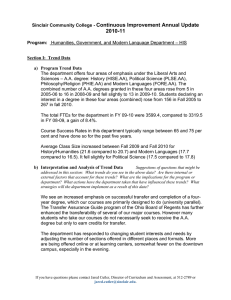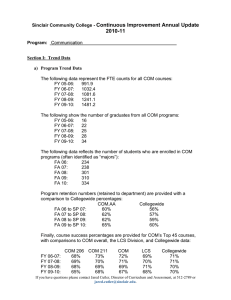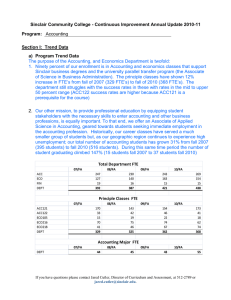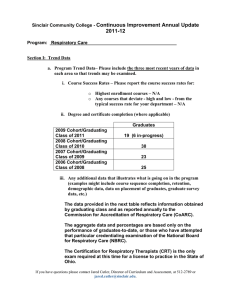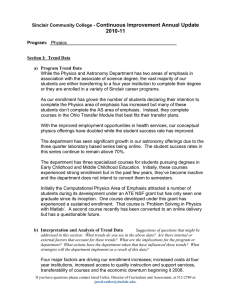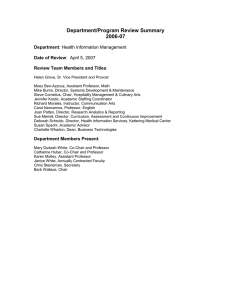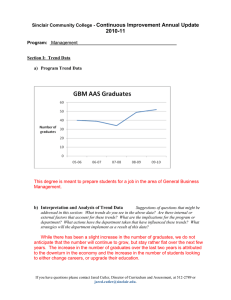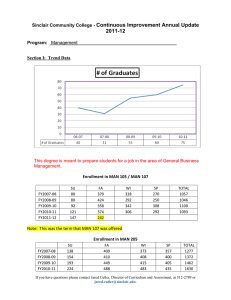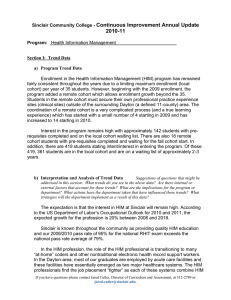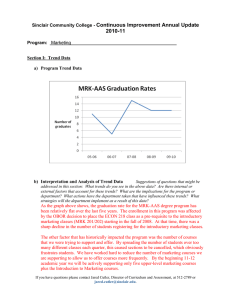Continuous Improvement Annual Update 2010-11
advertisement
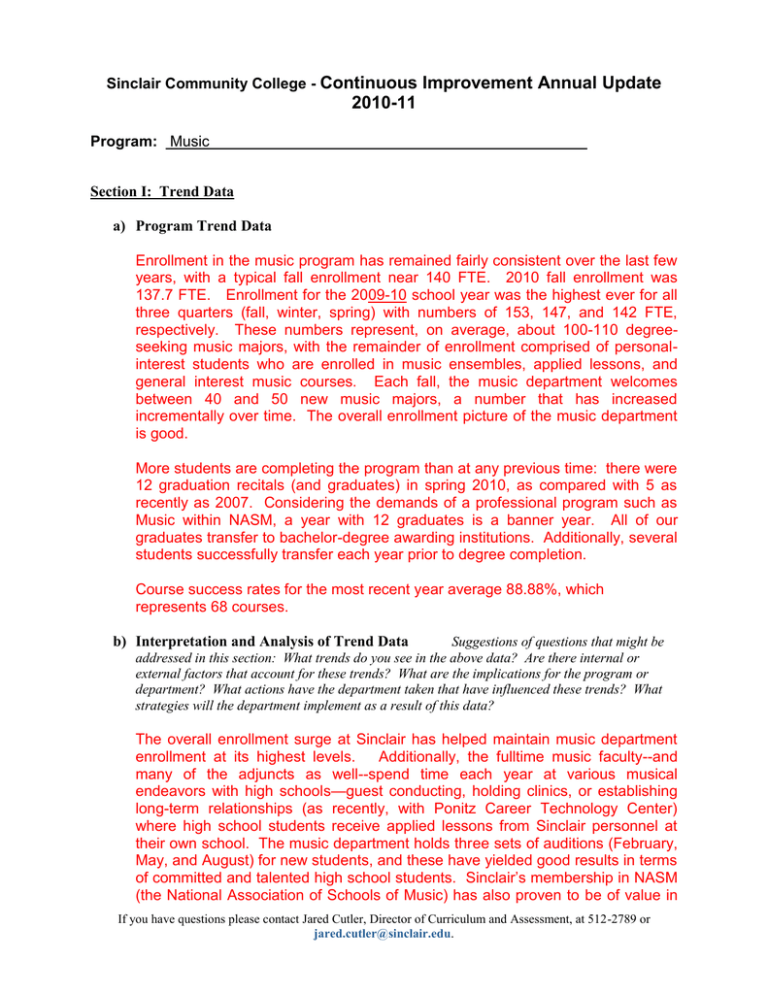
Sinclair Community College - Continuous Improvement Annual Update 2010-11 Program: Music Section I: Trend Data a) Program Trend Data Enrollment in the music program has remained fairly consistent over the last few years, with a typical fall enrollment near 140 FTE. 2010 fall enrollment was 137.7 FTE. Enrollment for the 2009-10 school year was the highest ever for all three quarters (fall, winter, spring) with numbers of 153, 147, and 142 FTE, respectively. These numbers represent, on average, about 100-110 degreeseeking music majors, with the remainder of enrollment comprised of personalinterest students who are enrolled in music ensembles, applied lessons, and general interest music courses. Each fall, the music department welcomes between 40 and 50 new music majors, a number that has increased incrementally over time. The overall enrollment picture of the music department is good. More students are completing the program than at any previous time: there were 12 graduation recitals (and graduates) in spring 2010, as compared with 5 as recently as 2007. Considering the demands of a professional program such as Music within NASM, a year with 12 graduates is a banner year. All of our graduates transfer to bachelor-degree awarding institutions. Additionally, several students successfully transfer each year prior to degree completion. Course success rates for the most recent year average 88.88%, which represents 68 courses. b) Interpretation and Analysis of Trend Data Suggestions of questions that might be addressed in this section: What trends do you see in the above data? Are there internal or external factors that account for these trends? What are the implications for the program or department? What actions have the department taken that have influenced these trends? What strategies will the department implement as a result of this data? The overall enrollment surge at Sinclair has helped maintain music department enrollment at its highest levels. Additionally, the fulltime music faculty--and many of the adjuncts as well--spend time each year at various musical endeavors with high schools—guest conducting, holding clinics, or establishing long-term relationships (as recently, with Ponitz Career Technology Center) where high school students receive applied lessons from Sinclair personnel at their own school. The music department holds three sets of auditions (February, May, and August) for new students, and these have yielded good results in terms of committed and talented high school students. Sinclair’s membership in NASM (the National Association of Schools of Music) has also proven to be of value in If you have questions please contact Jared Cutler, Director of Curriculum and Assessment, at 512-2789 or jared.cutler@sinclair.edu. terms of WSU, UD, and CSU students who start at those institutions but, for various reasons, transfer to Sinclair. The expectation is that enrollment in the music program will not decline, and that it will incrementally increase over time. Section II: Progress Since the Most Recent Review a) What was the fiscal year of the most recent Program Review for this program? FY 05-06 b) Briefly summarize the goals that were listed in Section IV part E of the most recent Program Review Self-Study (this section of the Self-Study asks “What are the department’s/program’s goals and rationale for expanding and improving student learning, including new courses, programs, delivery formats and locations”)? Section IV/part E: “Our rationale, as always, is to satisfy perceived demand in the local community, whether by offering newly developed courses in Music Technology or through newly-created ensemble experiences. We anticipate having a presence in the projected Warren County campus, and will adopt the same rationale of satisfying demand in whatever way we can.” c) Have these goals changed since your last Program Review Self-Study? If so, please describe the changes. No. d) What progress has been made toward meeting any of the goals listed above in the past year? In the past three years (including the past year), the music department has expanded into online offerings that have been well received. We have been offering Music Appreciation online for nearly three years, and have, in the past year, started offering History of Rock/Pop Music. Each course has attracted enough students initially to be offered in multiple sections. Our plan will be to continue this online presence with similar offerings in Jazz Appreciation and World Music. Since all of these courses qualify as Arts electives in the Transfer Module, we anticipate healthy enrollments here as well. We are offering applied piano, guitar, electric bass, and voice, as well as Music Appreciation and History of Rock/Pop (both in classroom formats) at the Courseview campus. This is, at the moment, probably the most the music department can effectively offer at Courseview. If you have questions please contact Jared Cutler, Director of Curriculum and Assessment, at 512-2789 or jared.cutler@sinclair.edu. e) What Recommendations for Action were made by the review team to the most recent Program Review? What progress has been made towards meeting these recommendations in the past year? Recommendations for Action: Collect and analyze data about the impact of the department’s community outreach to monitor and improve the results Document the assessment activity and evidence presented in the self study report, with specific attention to the number of students in the program compared to the number of graduates; seek assistance from IPR to support this research to increase the number of graduates and/or document the extent of transfer Through IPR, access information about graduates and pre-degree transferees in order to assess the effectiveness of the program Identify the patterns of evidence that emerge from the student learning experiences in the department in order to better respond to student needs Based on data, plan and initiate next steps for program improvements Conduct a needs analysis to assess the viability of a new technical program or track: in music (i.e., music industry) Explore grant funding and partnership prospects in order to acquire needed resources and/or equipment; use the resources of the Grants Office and the Dean’s Office as needed Study of other spaces available for course delivery, practice rooms (on and off campus) Fundraising from outside groups Progress Made in Past Year As a member of NASM, the music department is required to continually assess the effectiveness of its course-sequences in core music classes such as Music Theory, Ear Training, and Applied Music. This is done each spring, most recently Spring 2010, with results that are good: 85-95% of students are comprehending and retaining course content, making their anticipated institutional transfers successful. Generally speaking, about 10% of our music majors matriculate here at Sinclair, and procede to others institutions. (This was true in the 2009-2010 school year.) Our (ongoing) needs analysis indicates that online music courses are going to be the most practical, efficient, and productive means of increasing music department enrollment. A study of other community colleges’ space needs has indicated to our music department that the acquisition of Wenger practice room modules will be the best alternative to newly constructed or renovated space. A capital request for 5 such rooms is pending approval. If you have questions please contact Jared Cutler, Director of Curriculum and Assessment, at 512-2789 or jared.cutler@sinclair.edu. Section III: Assessment of Outcomes The Program Outcomes for this program are listed below. At least one-third of your program outcomes must be assessed as part of this Annual Update, and across the next three years all of these program outcomes must be assessed at least once. Music Program Outcomes 1) Identify and describe aural, analytical, and compositional techniques used by composer from 900 AD to the present time; demonstrate computer literacy with interactive music theory software. 2) Articulate the historical style characteristics of western European music as they changed from medieval to modern times. 3) Sight read on piano, harmonize, perform in ensembles, improvise, and demonstrate piano technique equivalent to established sophomore levels. 4) Perform standard college level solo and ensemble repertoire. In which courses are these program outcomes addressed? MUS 105, 111, 112, 113, 126, 139, 141, 142, 143, 211, 212, 213, 241, 242, 243 MUS 131, 132, 133 Which of these program outcomes were assessed during the last fiscal year? Assessment Methods Used Written and performance assessments at the conclusions of series of courses MUS 116, 117, 118, 121, 216, 217, 218 Performance MUS 109, 114, 119, 120, 124, 127, 154, 155, 158, 162, 166, 167192, 194, 195, 225, 229, 296 assessments at the conclusions of series a) For the assessment methods listed in the table above, what were the results? What changes are planned as a result of the data? How will you determine whether those changes had an impact? For each series of courses in the music curriculum (there are eight of them), assessment exams, either written and/or performance, are administered each spring quarter. The results of these exams show that 100% of students who remain enrolled achieve overall comprehension rates of 85-95%. These are satisfactory results. The department will continue to follow this method of assessment. If you have questions please contact Jared Cutler, Director of Curriculum and Assessment, at 512-2789 or jared.cutler@sinclair.edu. c) What other changes have been made in past years as a result of assessment of program outcomes? What evidence is there that these changes have had an impact? These are the series of core courses, which are annually assessed: Music Theory first year Music Theory second year Sight Singing/Dictation first year Sight Singing/Dictation second year Music Styles (History) Vocal Diction (French-Italian-German) Piano for Music Majors first year Piano for Music Majors second year In past years, the most changes which have been a result of assessment analysis have been in the Piano for Music Majors courses. Students in those courses acquire seven skills over a two year period. Because of some low scores in certain areas, the class time spent on task for these skills has increased or decreased in order to improve efficiency in all skill areas. c) Describe general education changes/improvements in your program/department during this past academic year (09-10). No changes have been implemented. Writing-related skills are addressed (within the music curriculum) in MUS 131-133, Music Styles. Oral skills are addressed in all performance requirements, but most especially in the graduation recital, a capstone requirement in which students speak at length about composers and works being performed. If you have questions please contact Jared Cutler, Director of Curriculum and Assessment, at 512-2789 or jared.cutler@sinclair.edu. Section IV: Improvement Efforts for the Fiscal Year a) FY 09-10: What other improvement efforts did the department make in FY 09-10? How successful were these efforts? What further efforts need to be made? If your department didn’t make improvement efforts during the fiscal year, discuss the strengths and weaknesses of the department over the last year and how the department plans to address them in the coming year. Most noteworthy changes would be: Chorale: Changed the meeting time of Chorale, the large choral ensemble, from daytime to evening to attract more community members. Collaborated with area high schools and church choirs for a large, invitational concert featuring Handel’s Messiah. This was quite a success. First offerings of History of Rock/Pop Music, an online course, very successful, will be ongoing each term. Our ongoing strengths are: an adjunct faculty that is tightly knit into the surrounding community and who love Sinclair enough to teach here, many of them, for decades a good relationship with Stivers High School, Ponitz Career Center, and all the music departments of all local universities continued accreditation status with NASM solid internal administrative support b) FY 10-11: What improvement efforts does the department have planned for FY 10-11? How will you know whether you have been successful? As mentioned already, the department is planning—hoping—for badly needed practice room modules to help solve the problem of lack of practice spaces for students. An overall efficiency improvement for the department will be sought in a request for a tenure track or ACF position in the next budget cycle. The department lost a position due to a retirement three years ago, and our current fulltime to adjunct instructional ratio was 60% adjunct/40% fulltime as of fall 2010. Replacement of the fulltime position that we lost will go a long way in easing the burden for our fulltime faculty, most of which are maxed out each term. Because the department will undergo a re-accreditation visit in 2014, it has already begun regularly scheduled meetings (quarterly at this point) toward that goal. Among the short- and long-term goals that the music department will be addressing over the next fiscal year as well as those immediately beyond: If you have questions please contact Jared Cutler, Director of Curriculum and Assessment, at 512-2789 or jared.cutler@sinclair.edu. Student handbook revision Possible formation of new ensemble – orchestra Expansion of online courses to include World Music and Jazz Appreciation Finding departmental funding for yearly renewal of Finale software for music theory classes Establishing articulation agreements with Ohio University and Bowling Greene State University Ongoing search, on-campus or off, for one additional rehearsal space Helping Advancement in securing donations that would specifically target music department needs Development of four department-related brochures to be used in recruitment efforts Addressing concerns regarding instrument and music-related equipment storage space Addressing student files issue with regard to location and archival access Within SCC parameters, formulate as useful a departmental web site as practicable Questions regarding completion of the Annual Update? Please contact the Director of Curriculum and Assessment at 512-2789 to schedule a time to review the template and ask any questions. If you have questions please contact Jared Cutler, Director of Curriculum and Assessment, at 512-2789 or jared.cutler@sinclair.edu.
